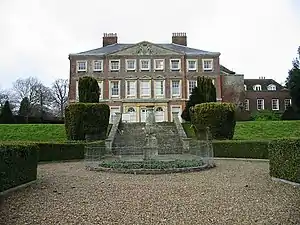Sir Brook Bridges, 3rd Baronet
Sir Brook William Bridges, 3rd Baronet (17 September 1733 – 4 September 1791)[1] was a British baronet and Whig politician.

Born at Whitehall, he was the only son of Sir Brook Bridges, 2nd Baronet and his wife Anne Palmer, daughter of Sir Thomas Palmer, 4th Baronet, of Wingham.[2] Born after his father's death and being the eldest son, he was born into the title and property of the baronetcy of Goodnestone Park in Kent.[2]
Education and career
Bridges was educated at Eton College and Trinity College, Cambridge until 1752[3] and began subsequently his Grand Tour.[4] In 1763, he entered the British House of Commons for Kent, representing the constituency as Member of Parliament (MP) until 1774.[5] He was for several years Receiver General of the land tax for Kent.[6]
Marriages and family
On 11 June 1765, he married Fanny Fowler, daughter of Edmund Fowler and heiress to the title Baron Fitzwalter, at St George's, Hanover Square in London. They had six daughters and seven sons.[6]
- Sophia (d. 1844), who married Col. William Deedes MP for Hythe. They had at least four sons.
- Harriet Mary, who married Rev. George Moore, son of the Most Rev. John Moore, Archbishop of Canterbury. They had one son, Edward, who later married Lady Harriet Montagu-Scott, daughter of Charles Montagu-Scott, 4th Duke of Buccleuch.
- Brook (14 Aug 1766-9 Jul 1781)
- Sir Brook William (22 Jun 1767-21 Apr 1829), who married firstly Eleanor Foote with whom he had three children including Brook Bridges, 1st Baron FitzWalter and Sir Brook William Bridges, 5th Baronet. He married secondly Dorothy Hawley, daughter of Sir Henry Hawley, 1st Baronet but without issue.
- Rev. Brook Henry (1 Jun 1769-20 Sep 1855), who married Jane Hales, daughter of Sir Thomas Hales, 4th Baronet. They had five children.
- Elizabeth (1773-1808), who married Edward Austen Knight, son of Rev. George Austen and older brother of Jane Austen (she visited them at Goodnestone regularly).[7] They had eleven children.
- Rev. Brook Edward (1779-23 Apr 1825), who married Harriet Foote, sister to Eleanor. They had two sons. (This is the "Edward Bridges" mentioned in Jane Austen's letters[8] and portrayed by Hugh Bonneville in Miss Austen Regrets.)[9]
Death and legacy
Bridges died, aged 58 in Portman Square in London[10] and was buried in Goodnestone. He was succeeded in the baronetcy by his second son William, who after the death of his older brother in 1781 had taken the additional Christian name Brook by licence of the archbishop.[10]
References
- "Leigh Rayment - Baronetage". Retrieved 2 July 2009.
- Burke, John (1832). A Genealogical and Heraldic History of the Peerage and Baronetage of the British Empire. vol. I (4th ed.). London: Henry Colburn and Richard Bentley. p. 144.
- "Bridges, Sir Brook, Bart (BRGS752B)". A Cambridge Alumni Database. University of Cambridge.
- Sir Lewis Namier & John Brooke, ed. (1985). The House of Commons, 1754-1790. vol. I. Cambridge: Secker & Warburg. p. 118.
- "Leigh Rayment - British House of Commons". Retrieved 2 July 2009.
- Debrett, John (1824). Debrett's Baronetage of England. vol. I (5th ed.). London: G. Woodfall. p. 421.
- http://www.goodnestoneparkgardens.co.uk/history-of-goodnestone.php
- "Reverend Brook Edward Bridges and the Bridges of Goodnestone Park". Jane Austen: Celebrating Bath's Most Famous Resident. Retrieved 21 July 2020.
- "BBC - Drama - Miss Austen Regrets". BBC. 27 April 2008. Retrieved 10 December 2013.
- Sylvanus, Urban (1791). The Gentleman's Magazine. part II. London: John Nichols. p. 876.
External links
| Parliament of Great Britain | ||
|---|---|---|
| Preceded by Robert Fairfax Sir Wyndham Knatchbull-Wyndham |
Member of Parliament for Kent 1763 – 1774 With: Robert Fairfax 1763–1768 John Frederick Sackville 1768–1769 Sir Charles Farnaby 1769–1774 |
Succeeded by Charles Marsham Thomas Knight |
| Baronetage of Great Britain | ||
| Preceded by Brook Bridges |
Baronet (of Goodneston) 1733–1791 |
Succeeded by Brook William Bridges |